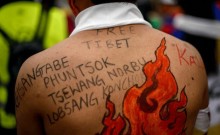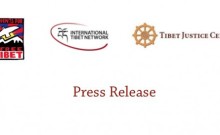JOINT LETTER TO G7 LEADERS 2014
21 May 2014
Rt Hon William Hague, Secretary of State for Foreign & Commonwealth Affairs, UK;
Mr John Kerry, Secretary of State, United States of America;
Hon. Frank-Walter Steinmeier, Minister for Foreign Affairs of the Federal Republic of Germany;
Hon. Laurent Fabius, Minister of Foreign Affairs, France;
Hon. John Baird, Minister of Foreign Affairs, Canada;
Ms Federica Mogherini, Minister of Foreign Affairs, Italy;
His Excellency Fumio Kishida, Minister for Foreign Affairs, Japan;
cc. Baroness Catherine Ashton, High Representative of the European Union for Foreign Affairs and Security Policy
Dear Ministers,
We are writing prior to next month’s G7 Summit to urge that you, as representatives of the world’s most influential countries, address the deteriorating human rights situation in Tibet in both your internal discussions and final public statement.
When the G8 Foreign Ministers met in April 2013 it was agreed that the G8 would take “collective responsibility and opportunity to use its influence to address some of the most pressing issues in the world”. While the final summit statement did include reference to some of the world’s most pressing issues and cited instances of human rights abuses across the globe, it failed to make any reference to Tibet. This was greatly disappointing, all the more so given Tibetans in Tibet are enduring a worsening crackdown, which has now seen more than 130 Tibetans setting themselves on fire as a means of protest.
As you know China recently faced scrutiny of its actions during its second Universal Periodic Review at the UN Human Rights Council. However, even in the light of strong criticisms and concerns arising from its review, the Chinese leadership continues to intensify its grip on Tibet by imposing severe limitations on freedom of expression and opinion, by detaining non-violent protesters without judicial process, and by interfering with cultural expression and religious tradition to the point where Tibetans believe their very existence as a people is at risk.
We believe this situation can be resolved only if the world’s most influential governments work together to maintain pressure on China to recognise and uphold universal values.
We appeal to you as G7 Ministers, based on your shared principles and responsibility to protect vulnerable populations wherever they may be. In March this year, the original G7 nations responded to Russia’s annexation of Crimea by voting to temporarily suspend Russia from the G8. This was a clear instance of standing by your principles.
We therefore call on you to seize the Brussels meeting as an opportunity to propose collective action for Tibet and to persuade China to end the current crackdown on the Tibetan people and to re-enter negotiations with representatives of the Dalai Lama in order to find a peaceful resolution for the Tibetan people.
Yours sincerely,
Alison Reynolds
Executive Director, International Tibet Network on behalf of the following G7 and EU Member Groups:
CANADA:
Canadian Tibetan Association of Ontario
Canada Tibet Committee
Ottawa Tibetan Association
Students for a Free Tibet Canada
Tibetan Cultural Association of Quebec
EUROPEAN UNION:
Austrian Committee for Tibet
Les Amis du Tibet-Belgique
Students for a Free Tibet, Denmark
Students for a Free Tibet, Poland
The Tibet Support Committee, Denmark
Vrienden van Tibet Belgium
FRANCE:
Aide aux Réfugiés Tibétains
Association Drome-Ardeche Tibet
France-Tibet
NICETIBET
Objectif-Tibet
Students for a Free Tibet, France
GERMANY:
Tibet Initiative Deutschland
JAPAN:
Students for a Free Tibet, Japan
ITALY:
Associazione Italia-Tibet
UNITED KINGDOM:
Free Tibet
Students for a Free Tibet, UK
Tibetan Community in the UK
Tibet Society
UNITED STATES OF AMERICA:
Bay Area Friends of Tibet
Committee of 100 for Tibet
Philadelphia Tibetan Association
Students for a Free Tibet International
Tibetan Association of Southern California
Tibet Committee of Fairbanks, Alaska
Tibet Justice Centre
TIBETMichigan
United Nations for a Free Tibet
US Tibet Committee
The International Tibet Network is a global coalition of 185 Tibet related non-governmental organizations representing over one million individuals. Network Member organisations regard Tibet as an occupied country and are dedicated to ending human rights violations in Tibet, and to working actively to restore the Tibetan people’s right under international law to determine their own political, economic, social, religious, and cultural status. See www.TibetNetwork.org




